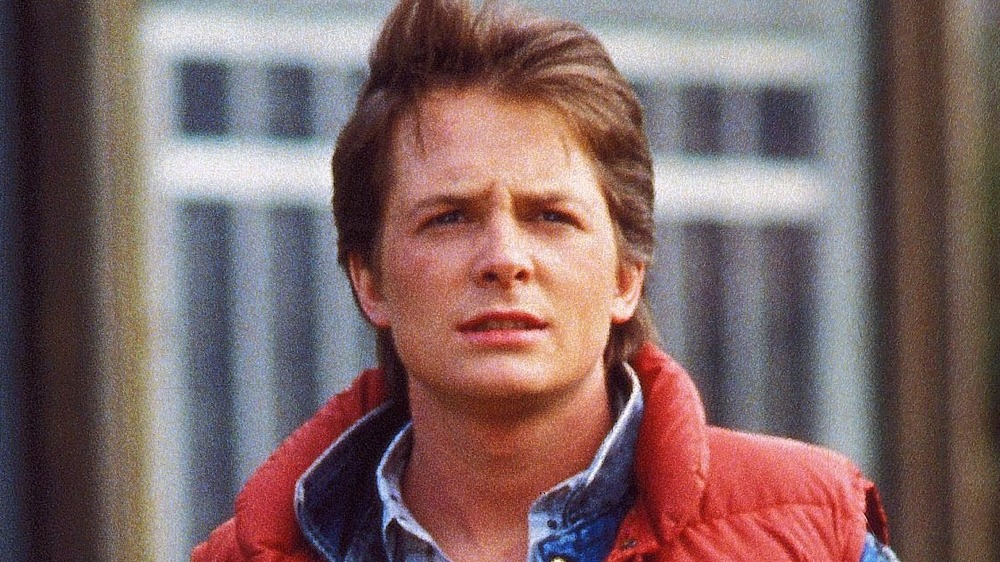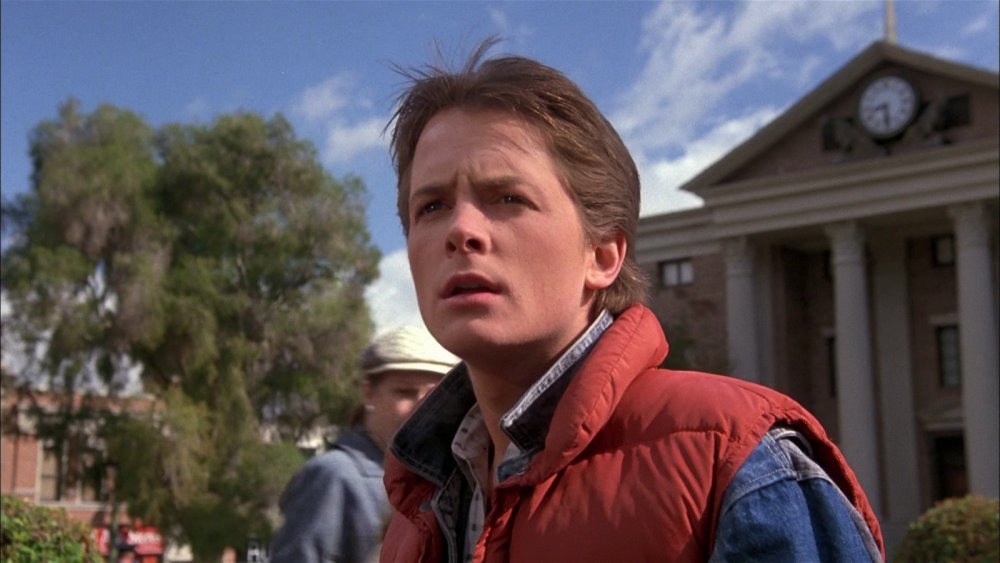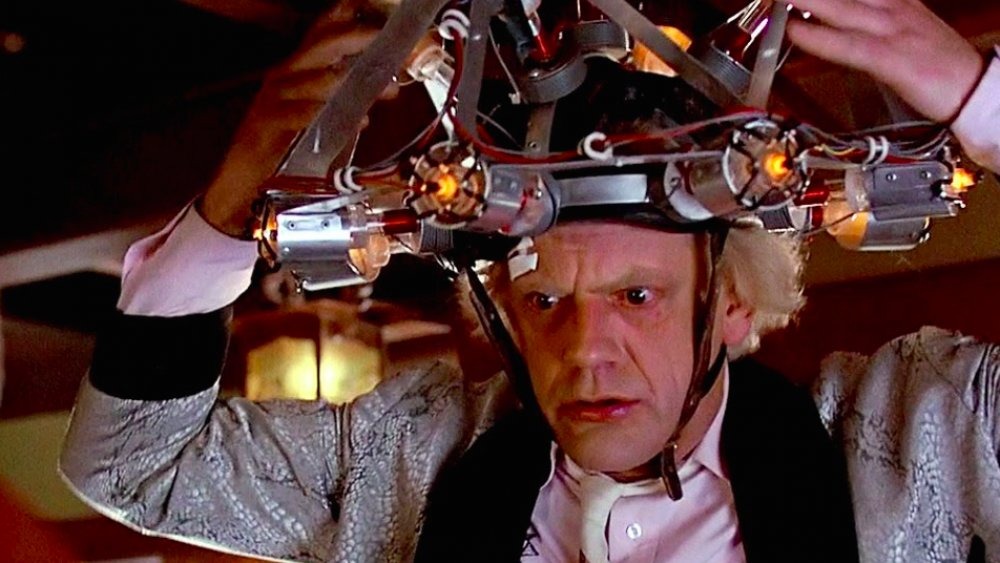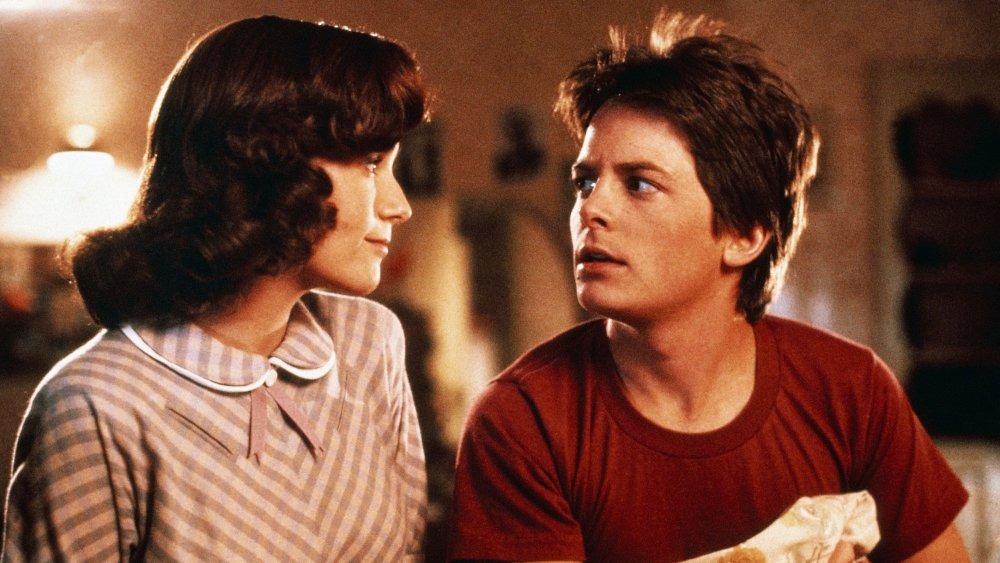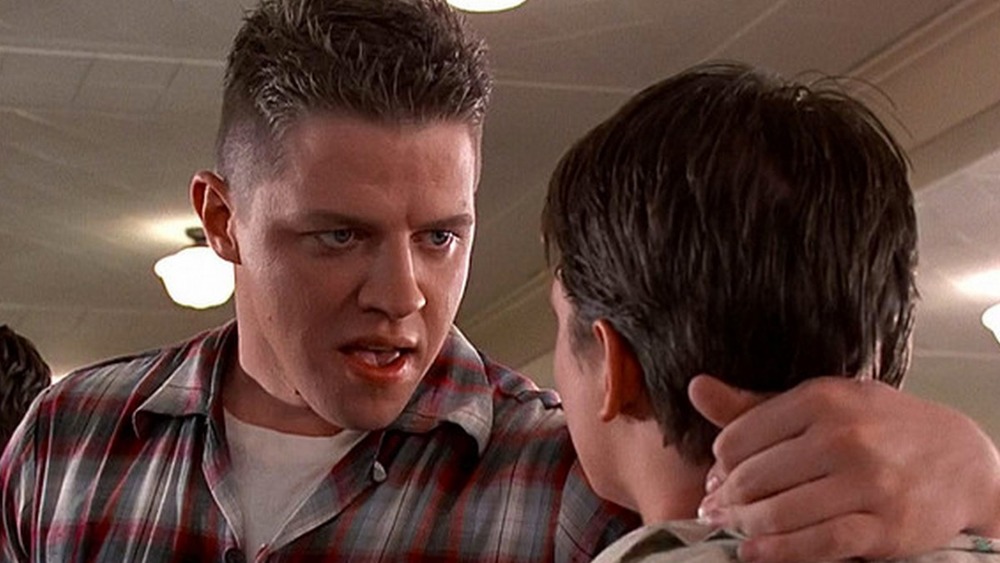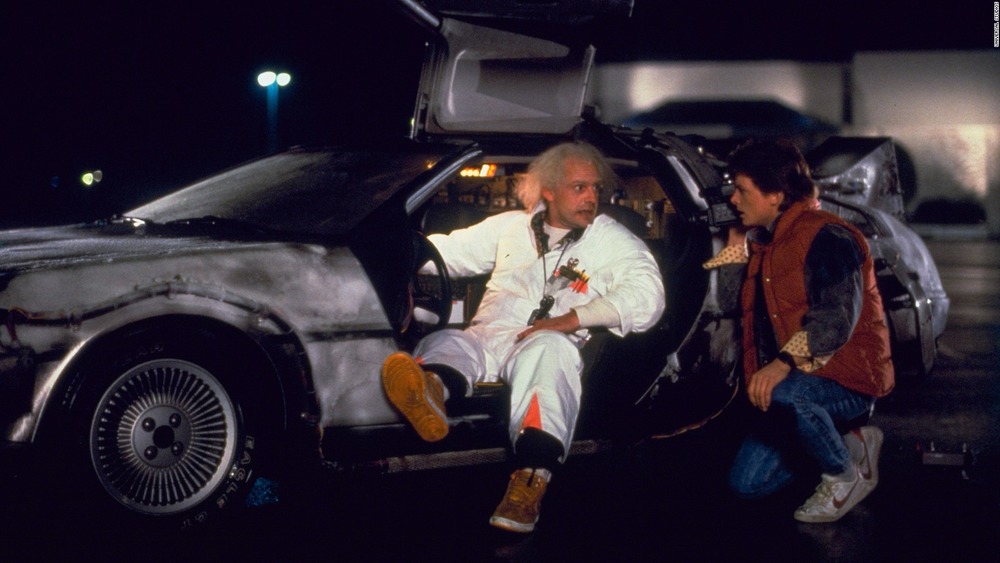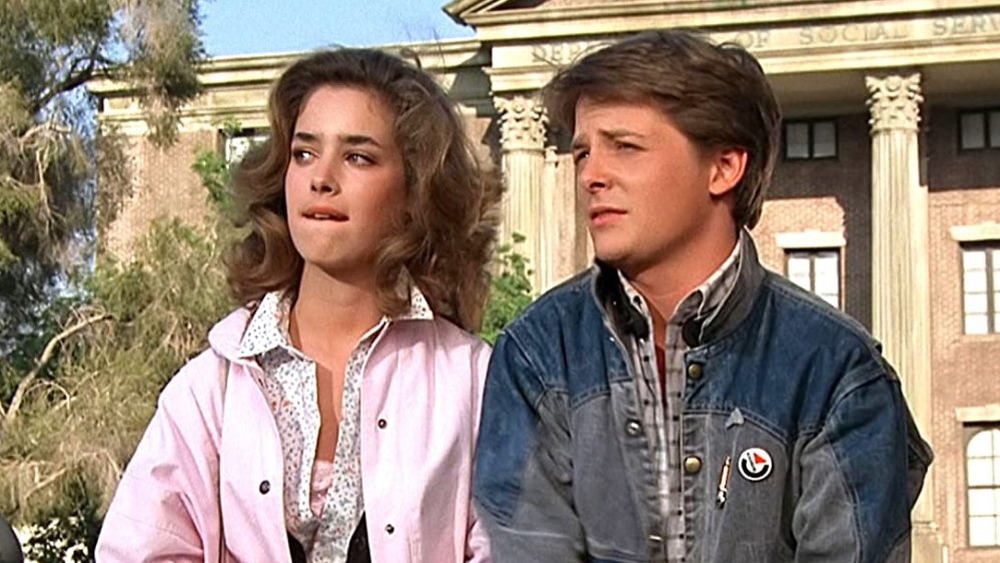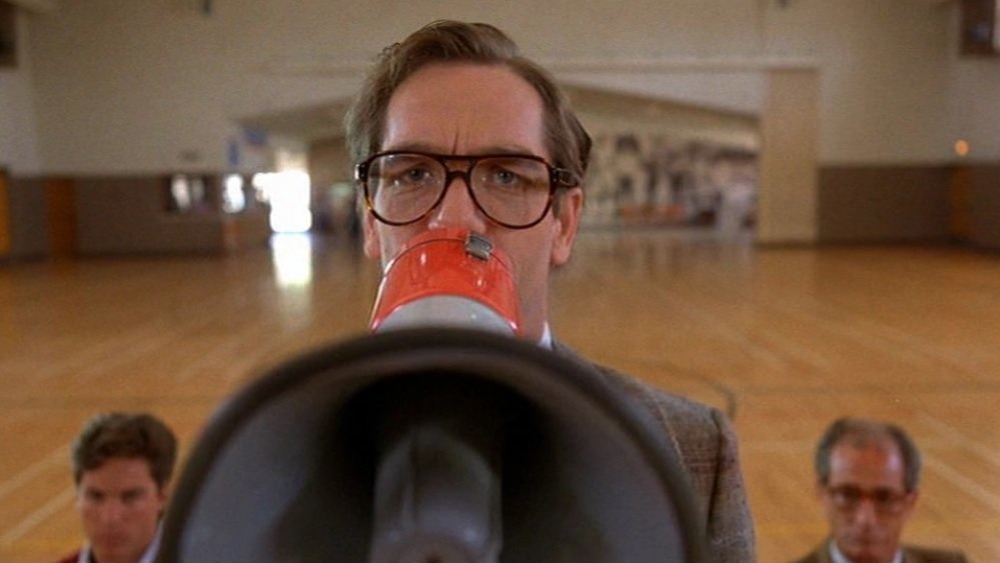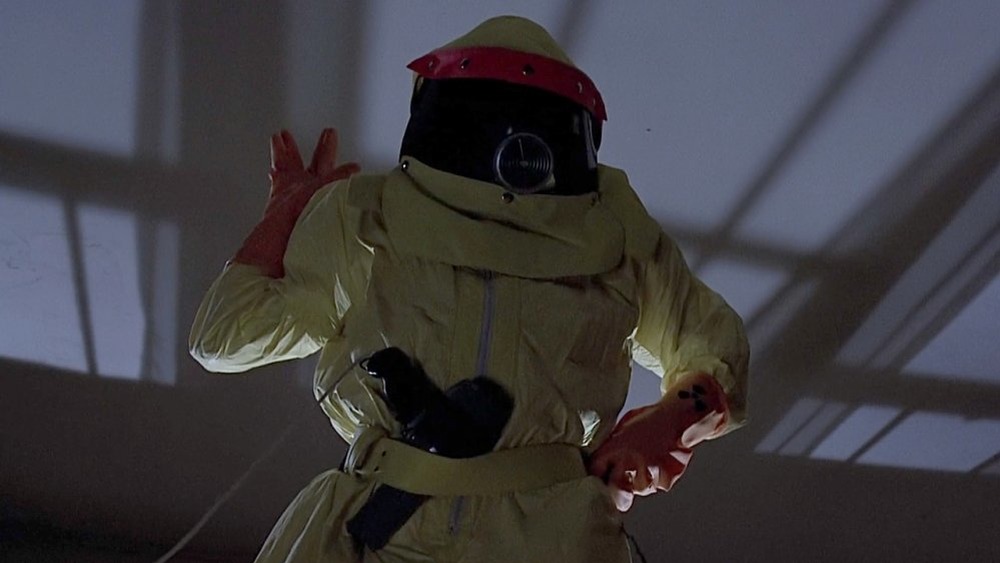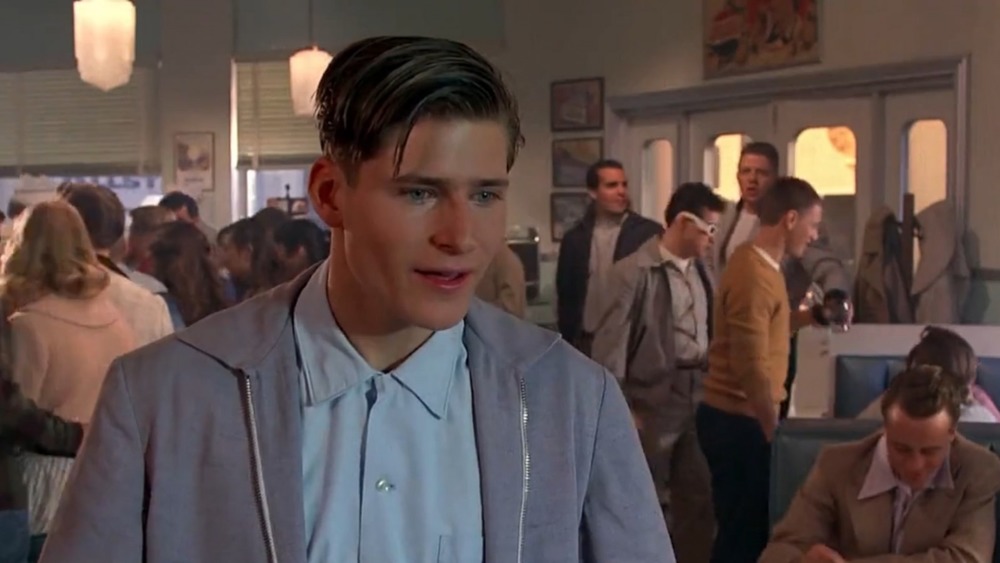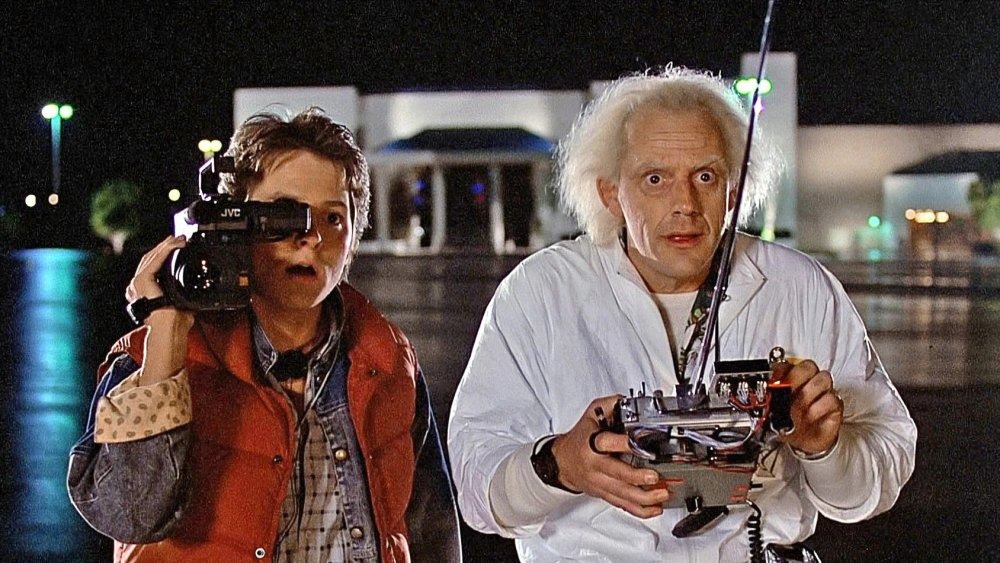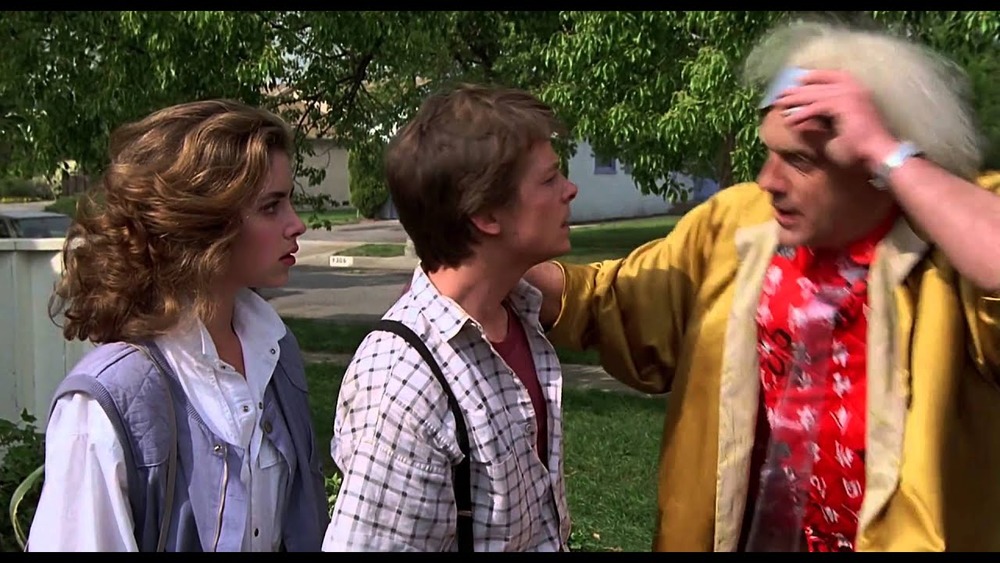Why Back To The Future Is The Best Sci-Fi Movie Of All Time
Who knew that the story of a boy, a scientist, and a time-traveling DeLorean could find its way into the hearts and minds of so many around the world? 1985's Back to the Future is a classic of 1980s blockbuster filmmaking, combining elements of science fiction, comedy, romance, and earnest, goofy fun to become an endearing and eternal piece of popcorn entertainment. It's so good, in fact, that we're confident in calling it the best sci-fi movie of all time.
Now, it's certainly a bold claim to say that any movie is the best anything of all time, but the deck is certainly stacked in Back to the Future's favor. The film has more than stood the test of time over the decades since its release, and there are a myriad of reasons why. Robert Zemeckis and Bob Gale's masterpiece sci-fi comedy is a sterling example of science fiction — perhaps the example of science fiction. So grab your skateboard, order up a Pepsi, and get ready to go 88 MPH, because we're looking at why Back to the Future is, indeed, the best sci-fi movie of all time!
Marty McFly is a perfect protagonist
If you're going to have a great story, you need a great protagonist to carry it on their shoulders. It's hard to find a hero with as much charm, humanity, and humor as lovable teenage rockstar Marty McFly. Brought to life by the brilliant Michael J. Fox, Marty's whole world is thrown upside down when, after traveling back to 1955, he finds himself face to face with his loser father — not to mention caught in a love triangle with his own mother. This is a less-than-ideal scenario for any protagonist, but definitely a hilarious one.
Marty is a successful lead not only because he seems like the coolest kid in school, but because he actually isn't. His charm draws viewers in, but his true self is clumsy, awkward, prone to truancy, and as Huey Lewis himself says, "just too darn loud." His pursuit of musical fame, his deep love for those around him, and his gee-whiz attitude all add up to one of the most enduring lead characters in film history.
Doc Brown is the perfect comic foil and partner
Even though the mad scientist archetype had been around for many years, it's hard to find a mad scientist as deranged, heartwarming, and hilarious as Christopher Lloyd's Doc Brown. With his wide-eyed expression, eternally frazzled hair, and constant, restless roaming (not unlike a caged lab rat), Doc Brown's plutonium-fueled antics are an integral part of the Back to the Future mythos. More importantly, they make him a brilliant comic foil to our hero, Marty McFly.
Marty and Doc's friendship is an unlikely one, with much of its basis and origin left to the viewer's imagination. Many a comedian has riffed on this vagueness over the years — that's how enduringly odd their bond is. Yet for all its strangeness, this friendship is a genuine one. Sure, it exists inexplicably between a teenager and a disgraced nuclear physicist, but it provides the perfect bedrock for Back to the Future's ensuing time-travel hijinks. Only a truly weird friendship could power such a winningly weird movie.
It uses its sci-fi premise to explore themes of destiny, repression, and family
A good piece of science fiction can be nothing more than a fun story that just happens to involve aliens, robots, spaceships, or whatever other futuristic ephemera you'd like to throw in there. But a truly great sci-fi story takes those elements and uses them to explore deep themes of humanity, life, and the nature of the world around us.
Thus succeeds Back to the Future. This movie isn't just a fun-loving, high-concept comedy that considers the weirder possibilities of time travel — it also uses its daring sci-fi premise to explore the strange relationships that children have with their parents. Back to the Future proposes that really, we don't know our parents' true selves. This is a lesson everyone tackles at some point, and it often forms the cornerstone for many people's adult relationships with their parents. It's only through time travel that Marty is able to really connect with his parents, having finally uncovered their real selves. Thus the movie's sci-fi set-up delivers its moving message.
Biff Tannen is as menacing a villain as they come
Is there a bully as memorably fearsome, chaotic, and idiotic as Back to the Future's Biff Tannen? Played to jerkish perfection by Thomas F. Wilson, Biff serves as a brilliant menace to the McFly family. He first appears in the original 1985 timeline as George McFly's cruel bully of a boss, and is later revealed to have been just as cruel to George all the way back in 1955. That's right: He's been a tyrant since his teenage years.
It's only when George is able to build up the courage to save Lorraine and beat the crud out of Biff that their odious relationship is reversed. Upon Marty's return to 1985, he discovers Biff has become a lowly, servile employee to the now confident and successful George McFly. In a film filled with memorable performances, Wilson's Biff hits a sweet spot of cartoonish realism that makes his brand of villainy stick in fans' minds years after viewing.
The DeLorean is a brilliant piece of sci-fi transportation
It takes a film as memorable as Back to the Future to completely dominate the pop culture market on an entire brand of motor vehicle. Even though it's been decades since the first film's release, it's still practically impossible to even mention the word "DeLorean" without everyone in the vicinity's mind going straight to Back to the Future. The film took a fascinatingly weird car with super funky doors and transformed it into one of the most iconic pieces of sci-fi technology out there.
In the real world, the DeLorean was an utter failure in the consumer market. Tough news for the DeLorean's makers, but this grim fate only makes its place in Back to the Future more hilarious and endearing. Doc Brown takes a junk product of pseudo-sleek early '80's materialism and uses it for his own genuinely groundbreaking scientific exploration. Thanks to this ingenious bit of cinematic foolishness, the DeLorean has no chance of escaping the public consciousness any time soon — unless it were to hit 88 MPH, of course.
Back to the Future perfectly captures the 1980s and the 1950s
One of the biggest worries fans end up having for a film as popular as Back to the Future is what might happen if a reboot, remake, or rehash is made. This prospect is frightening for all the usual reasons when it comes to Back to the Future, from so-so actors to awkward attempts to modernize the movie. But a remake would also run the risk of ruining a fundamental aspect of this film: Its commentary on the 1980s and 1950s.
Taking a character from the world of the rockstar 1980s and transplanting him back three decades results in a brilliant mish-mash of sensibilities, tones, and perfect comedic riffs on pop culture. The looks Marty gets for daring to say Ronald Reagan could become president are priceless, not to mention the film's ability to self-reflexively comment on the sexual repression and stuck-up tendencies of 1950s America. While you could still find some genuine bits of cultural commentary in a new version of the film, it'd be hard to top the insight, poignance, and humor of the original Back to the Future's decade-hopping story.
Back to the Future's soundtrack is one of the best
It's one thing to have a film with one of the most memorable scores in history. It's another to have inspired not one, but two sensational pop songs that have lasted in the popular consciousness for decades. But to have a film that can do both — well, that's just taking things to a whole new level. If a film can do that, and have one of its featured musicians make a cameo appearance, it becomes legendary. Back to the Future is that film (and Huey Lewis in the Battle of the Bands auditions is that cameo).
Back to the Future boasts one of the most memorable themes in cinema, composed by frequent Zemeckis collaborator Alan Silvestri. Huey Lewis and the News' two musical contributions, the appropriately named "Back In Time," and the Oscar-nominated "The Power of Love," are utterly iconic to this day. Altogether, the movie's soundtrack is a collection of outright bops that further the legacy of this sci-fi sensation into the world of popular music.
It made terms like "flux capacitor" part of the vernacular
A lesser-known fact about good sci-fi: It's all about that weird, weird jargon. For better or for worse, creating new sci-fi-sounding terminology can deepen the otherworldliness of the story being told, convey familiar concepts in unfamiliar ways, and help a work of fiction stick around in the public's consciousness.
Back to the Future certainly obeys these rules, especially when it comes to explaining the nonsense time travel mechanics of the DeLorean. While one could maybe trust the audience to just say to themselves, "Well, the thing runs on plutonium, that's good enough for me," Zemeckis and Gale went the extra mile, inventing the fictitious "flux capacitor" to add some sense of believability to this unbelievable universe. Even fake measurements like "jigowatt," a term basically derived from director Robert Zemeckis' foolish mispronunciation of "gigawatt", are extremely successful in adding some scientific flair to the proceedings. Great Scott, indeed!
The script fits together like clockwork
From that first Rube Goldberg-ian shot of Doc Brown's successful-ish breakfast machine, it's clear that Zemeckis and Gale have interconnected mechanics in mind. The world of Back to the Future is an endlessly complex puzzle, filled with Easter eggs, callbacks, payoffs, and all sorts of other brilliant narrative creativity, that demands multiple rewatches from fans looking to put it all together.
From the architecture of the town square of Hill Valley, to the history of the clock tower and how it plays into the film's climax, to the events leading up to that fateful Enchantment Under the Sea dance, one of the biggest draws to Back to the Future is the way the film is constantly calling back to itself. It's like a jigsaw puzzle, that, when put together, reveals itself to be a mirror. It's endless fun to fit the movie together, and surely a big reason it's become such a huge hit over the years. Who can resist a good puzzle?
It has some of the funniest and most memorable lines around
Clockwork precision and time travel antics do not a great film make. To truly cement your movie in the annals of cinema history, you're going to need some memorable dialogue to keep your audience engaged and talking about the movie for decades to come. Luckily, Gale and Zemeckis' script is chock-full of memorable lines, hilarious jokes, and all-time zingers that are still as quotable today as they were the very first moment they hit the silver screen.
Where to even begin? "You're my density." "This is heavy; weight has nothing to do with it." "Chuck, it's your cousin, Marvin. Mavin Berry. You know that new sound you're looking for? Well listen to THIS!" It all wraps up in that brilliant closing line: "Roads? Where we're going, we don't need roads!" There's an endless supply of fantastically crafted punchlines and retorts in the movie, as heavy with emotion as they are with humor. Together, they elevate the Back to the Future screenplay into one of the all-time greats.
It has one of the best endings in sci-fi history
At the end of Back to the Future, just when Marty thinks his life has gotten back to normal, in swoops in the DeLorean, driven by a crazy-as-ever Doc Brown. He's clad in the zaniest clothes this side of Hill Valley, and he's here to warn Marty and Jessica that there's a problem in the future with their kids. All they can do is jump into the newly souped-up DeLorean and fly off into the future with Doc, ready for another rip-roaring adventure.
This brilliant cliffhanger of an ending ended up spawning a franchise that includes two more sequels, an animated series, and even a musical adaptation. In this, the ending is both the cherry on top of a wonderful movie, and the beginning of the franchise's legacy as one of the most daring and fantastic works of science fiction filmmaking ever made. We think it's the very best example of the genre around, and though we don't know what the future holds for the venerable franchise, we do know this: Wherever Back to the Future goes next, it sure doesn't need roads.
